Greer Gilman's Blog, page 38
February 2, 2016
Vanitas
I have just found these small, grave, melancholy paintings by an Uzbek painter named Erkin Kuvandikov. They remind me of the drowned cargo of china that I saw at the Davis Museum at Wellesley: meditations on fragility and time.
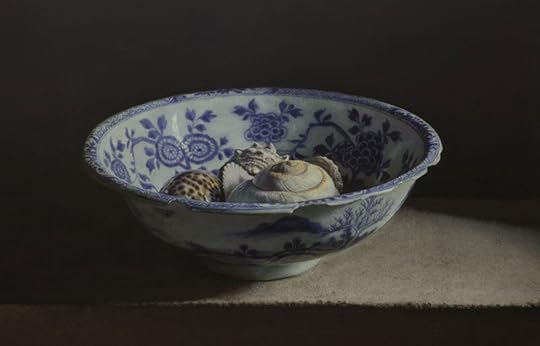
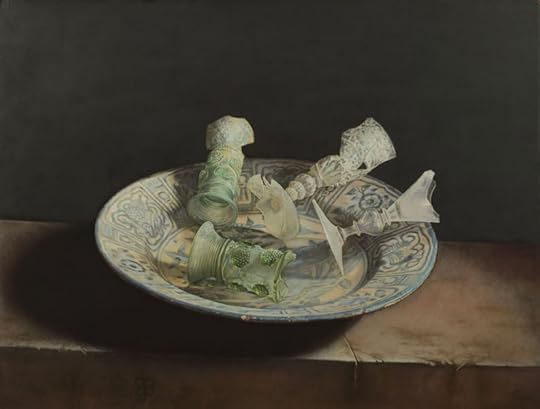


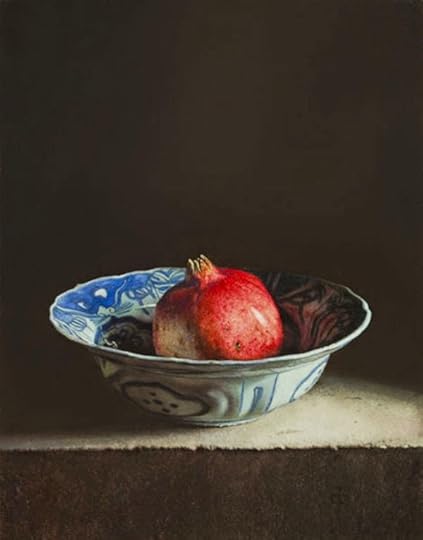
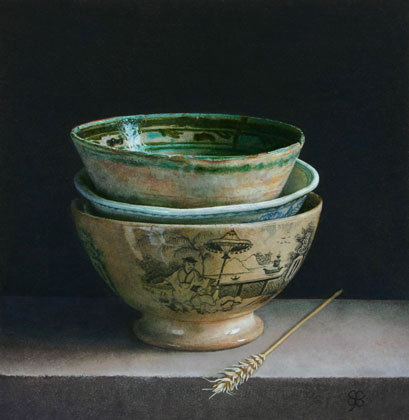
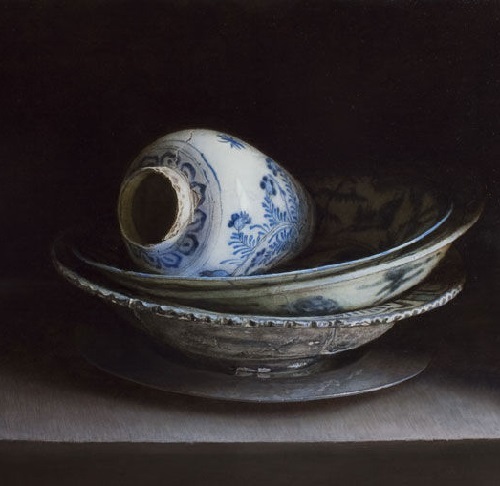
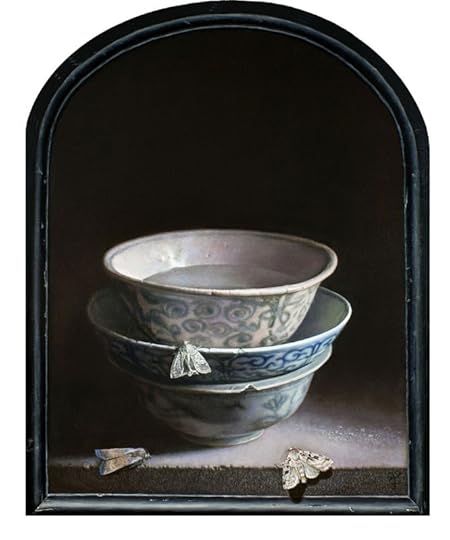
Nine








Nine
Published on February 02, 2016 15:25
Candlemas
She is the coming out of darkness: light from the tallow, snowdrops from the earth, bride from the winter hillside; and from Hell, the child returned.
Nine
Nine
Published on February 02, 2016 14:55
January 31, 2016
Constellation
My favorite wainscot convention, Vericon, is coming up next month, March 18th to 20th. Isn't this a lovely small Pleiades of guests?
Nine
Nine
Published on January 31, 2016 23:05
January 23, 2016
There I cowch when Owles doe crie
A noble consortium of libraries has put up online just about every scrap of paper relating to William Shakespeare from his time and a few years afterward—a treasure house!
At random, here is the first lute setting for "T was a louer and his lasse."

Gabriel Harvey's elegant, obsessive marginalia: what to read next? Richard III. Hamlet.
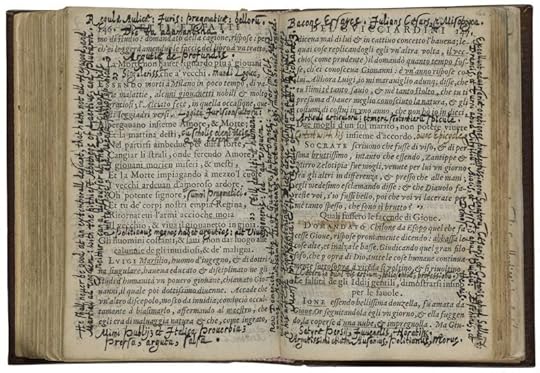
Here Shakespeare's young neighbor Leonard Digges (whose father was the first English Copernican, "but discarded the notion of a fixed shell of immoveable stars to postulate infinitely many stars at varying distances") scrawls on a flyleaf. You'll like these sonnets, he says: Lope de Vega is accounted in Spain "as in Englande wee sholde of or: Will Shakespeare."
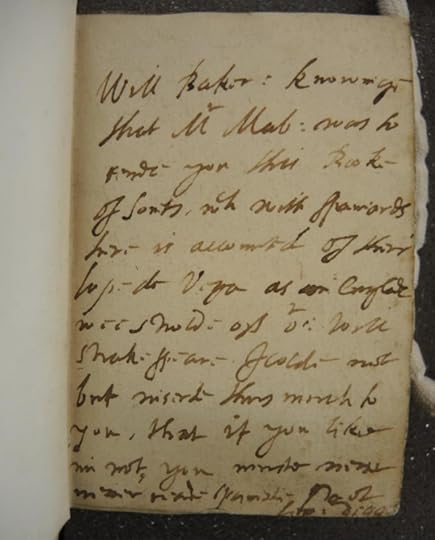
Ben Jonson, having walked to Scotland, falls into a tun of canary and holds forth: Drummond of Hawthornden scribbles down what must have been the best damned one-man panel ever:
That Don[n]e, for not keeping of accent, deserved
hanging.
That next himself only Fletcher and Chapman could
make a Mask.
That Shakspear wanted Arte.
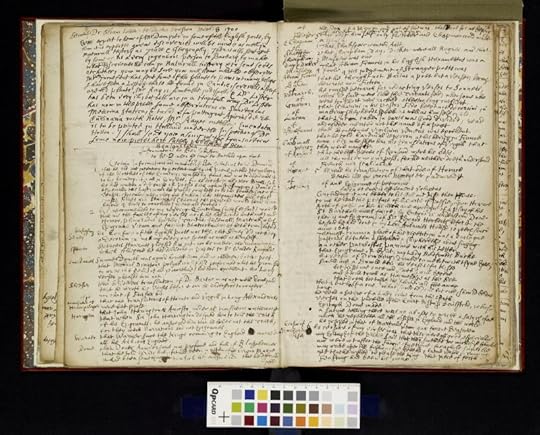
Dip in or dive!
Nine
At random, here is the first lute setting for "T was a louer and his lasse."

Gabriel Harvey's elegant, obsessive marginalia: what to read next? Richard III. Hamlet.

Here Shakespeare's young neighbor Leonard Digges (whose father was the first English Copernican, "but discarded the notion of a fixed shell of immoveable stars to postulate infinitely many stars at varying distances") scrawls on a flyleaf. You'll like these sonnets, he says: Lope de Vega is accounted in Spain "as in Englande wee sholde of or: Will Shakespeare."

Ben Jonson, having walked to Scotland, falls into a tun of canary and holds forth: Drummond of Hawthornden scribbles down what must have been the best damned one-man panel ever:
That Don[n]e, for not keeping of accent, deserved
hanging.
That next himself only Fletcher and Chapman could
make a Mask.
That Shakspear wanted Arte.

Dip in or dive!
Nine
Published on January 23, 2016 21:02
January 21, 2016
David Hartwell
Damn. Another legend gone. He was never my editor, but he once greatly praised me: he said that Moonwise was the quintessential Readerconnish book. I treasure that. I always liked talking with him over his ramparts of pulp; just once, I had dinner with him and Paul Williams. He knew or had known everyone, had read or was reading everything, and he remembered all. I hope someone, somewhere took down his stories: he was a very great raconteur, the John Aubrey of our little, lessened galaxy. And his ties should be suspended in a zone of light in the Smithsonian.
Nine
Nine
Published on January 21, 2016 00:52
January 15, 2016
A sad tale's best for winter
Give me the National Theatre! Give me the Globe! The West End Shakespeare that I've seen of late has been deeply disappointing—first the Cumberbatch mudslide Hamlet and now an overstuffed Winter's Tale. It was worth it for its centerpiece: Judi Dench is a magnificent Paulina. Sadly, she comes with Kenneth Branagh out-Heroding Herod as Leontes. I swore I'd never again see anything that Branagh directed, least of all himself; but Dench as Paulina was too alluring to resist.
The broadcast began with Branagh as God's voice in an empty theatre, laying down the law: all other Shakespeare, he said, is bombastic, mere empty declamation; he alone has taught his company to speak it from the heart to listeners' hearts. He alone keeps the gate to Shakespeare's genius. Of course I've simplified his stump speech: this was a full five minutes of oracular orotundity, while the camera circled the chandeliers and lingered on the gilded putti, coying them.
This was followed by three hours of the worst-spoken Shakespeare I have ever heard from professionals. Not the old stagers, who'd been properly trained, but just about everyone younger than Branagh. It didn't help that they were mic'd. They shouted in staccato, all at one pitch; they broke the lines in the oddest blocks, disregarding both grammar and poetics. Not like a tangled chain, but one unlinked, as if they'd learned in four- or five-word segments, and were always scrabbling in their minds to hook the next. There was never quite a pause, but they drew breath in the weirdest places. Hermione was worst. In her trial scene, she stood and shouted at the gods--not those in heaven but the gallery. Her back was to the whole tribunal, and she never looked them in the face.
But I o'erleap myself.
The curtain rose on Dench--the Garrick knows on what side their bread is buttered--asking Mamillius for his sad tale. (She played Time as well.) The mis-en-scène was lifted straight from Fanny and Alexander--Christmas tree, sailor-suit, and all. There was much exchange of Symbolic Gifts: a snow-globe, of course; and a Bergmanesque reel of film, home movies, which were then projected: all distracting, in their kitsch and flicker, from the story.
Branagh always has to stand between the audience and Shakespeare, to interpret for him. He never trusts the man to speak, his audience to understand.
Dench was the focus: she had the power to draw all others into playing. Even that Hermione descended for her: breathed. As long as Paulina was on, there were gasps from the audience, laughter, awe.
What else was good? Antigonus (who drew the bear away from Perdita); Camillo (who looked like the broadest of butlers). The relief of a downcast Leontes. An almost-but-not-quite brilliant Autolycus (an immensely tall and thin wide boy): he was long and wicked as a Zoot-suit wolf, but the frenetic direction made him all a bundle of squibs and crackers: a monotony of bangs. Polixenes had moments: he was best in disguise. I think another director might have done much with the Perdita: a lovely child with red-gold hair, and a sort of Elfine innocence. She can sing. And she got to wear Autolycus's hat with its dingy peacock feathers.
Damn it all, the text was uncut. They kept all the little oddities: Mamillius on ladies' eyebrows; Cleomenes and Dion, on the road from Delphos. I thought: this may be the only "Every 'leven wether tods" I ever hear. I wish they'd let Shakespeare speak for himself.
Nine
The broadcast began with Branagh as God's voice in an empty theatre, laying down the law: all other Shakespeare, he said, is bombastic, mere empty declamation; he alone has taught his company to speak it from the heart to listeners' hearts. He alone keeps the gate to Shakespeare's genius. Of course I've simplified his stump speech: this was a full five minutes of oracular orotundity, while the camera circled the chandeliers and lingered on the gilded putti, coying them.
This was followed by three hours of the worst-spoken Shakespeare I have ever heard from professionals. Not the old stagers, who'd been properly trained, but just about everyone younger than Branagh. It didn't help that they were mic'd. They shouted in staccato, all at one pitch; they broke the lines in the oddest blocks, disregarding both grammar and poetics. Not like a tangled chain, but one unlinked, as if they'd learned in four- or five-word segments, and were always scrabbling in their minds to hook the next. There was never quite a pause, but they drew breath in the weirdest places. Hermione was worst. In her trial scene, she stood and shouted at the gods--not those in heaven but the gallery. Her back was to the whole tribunal, and she never looked them in the face.
But I o'erleap myself.
The curtain rose on Dench--the Garrick knows on what side their bread is buttered--asking Mamillius for his sad tale. (She played Time as well.) The mis-en-scène was lifted straight from Fanny and Alexander--Christmas tree, sailor-suit, and all. There was much exchange of Symbolic Gifts: a snow-globe, of course; and a Bergmanesque reel of film, home movies, which were then projected: all distracting, in their kitsch and flicker, from the story.
Branagh always has to stand between the audience and Shakespeare, to interpret for him. He never trusts the man to speak, his audience to understand.
Dench was the focus: she had the power to draw all others into playing. Even that Hermione descended for her: breathed. As long as Paulina was on, there were gasps from the audience, laughter, awe.
What else was good? Antigonus (who drew the bear away from Perdita); Camillo (who looked like the broadest of butlers). The relief of a downcast Leontes. An almost-but-not-quite brilliant Autolycus (an immensely tall and thin wide boy): he was long and wicked as a Zoot-suit wolf, but the frenetic direction made him all a bundle of squibs and crackers: a monotony of bangs. Polixenes had moments: he was best in disguise. I think another director might have done much with the Perdita: a lovely child with red-gold hair, and a sort of Elfine innocence. She can sing. And she got to wear Autolycus's hat with its dingy peacock feathers.
Damn it all, the text was uncut. They kept all the little oddities: Mamillius on ladies' eyebrows; Cleomenes and Dion, on the road from Delphos. I thought: this may be the only "Every 'leven wether tods" I ever hear. I wish they'd let Shakespeare speak for himself.
Nine
Published on January 15, 2016 02:01
January 13, 2016
Nothing with kings, nothing with crowns ...
Here's my 2016 Arisia schedule, tailor-made in Size Nine. Looking forward to some lively conversations, with some awesome folks. (Hey,
 sovay
!)
sovay
!)
The Founding Mothers of SF/F
Sat 10:00 AM
Catherine Lundoff (m), Greer Gilman, Debra Doyle, Victoria Janssen, JoSelle Vanderhooft
As we know, women invented all our favorite stuff! Mary Shelley defined science fiction with Frankenstein; Baroness Emma Orczy invented the superhero with The Scarlet Pimpernel. Let's discuss the founding mothers of science fiction, fantasy, and horror.
Shifting the Language of SF
Sat 1:00 PM
John Chu (m), Greer Gilman, Debra Doyle, Lawrence M. Schoen, Heather Albano
Very few SF authors of the many who set stories in the far future ever speculate what language may sound like in following centuries and distant stars. Some formative works, like Burgess' A Clockwork Orange and Orwell's 1984 include this as a theme. Who else? What are the dangers of speculating vernacular? How might the language our descendants speak differ from ours? What works in SF imagine how the kids talk in the far future?
Welcome to the Underworld
Sat 7:00 PM
Terri Bruce (m), Gabriel Squailia, Daniel José Older, Greer Gilman, Sonya Taaffe
Mythic, personal, or speculative, we'll be talking about human consciousness after death and what it may or may not encounter. What are the most compelling afterworlds in fiction, which ones have the best shot at being plausible, and which ones inspire you in life?
Complexities of Voice
Sun 11:30 AM
Trisha Wooldridge (m), Constance Burris, Greer Gilman, Ctein, John Chu
How do we choose the voices we write with, and how do those choices influence plot, theme, flow?
Fantasy Reading
Mon 1:00 PM
Terri Bruce, Greer Gilman, Resa Nelson, N.S. Dolkart
Come listen to our panelists read a selection from their original fantasy works.
The Story Within the Story
Mon 2:30 PM
Heather Urbanski (m), Greer Gilman, Sonya Taaffe, Elizabeth Birdsall, MJ Cunniff
Relatively few SFnal works give narrative the kind of central role within their heroes' world that it often plays in our own. What works have best created stories within a story, and which are notable for the absence of a literary tradition where you might expect to find one?
Wait, what? Monday at 2:30? Après nous le chien mort.
Hope to see you at the windswept Westin-Way-Out-There!
Nine
 sovay
!)
sovay
!)The Founding Mothers of SF/F
Sat 10:00 AM
Catherine Lundoff (m), Greer Gilman, Debra Doyle, Victoria Janssen, JoSelle Vanderhooft
As we know, women invented all our favorite stuff! Mary Shelley defined science fiction with Frankenstein; Baroness Emma Orczy invented the superhero with The Scarlet Pimpernel. Let's discuss the founding mothers of science fiction, fantasy, and horror.
Shifting the Language of SF
Sat 1:00 PM
John Chu (m), Greer Gilman, Debra Doyle, Lawrence M. Schoen, Heather Albano
Very few SF authors of the many who set stories in the far future ever speculate what language may sound like in following centuries and distant stars. Some formative works, like Burgess' A Clockwork Orange and Orwell's 1984 include this as a theme. Who else? What are the dangers of speculating vernacular? How might the language our descendants speak differ from ours? What works in SF imagine how the kids talk in the far future?
Welcome to the Underworld
Sat 7:00 PM
Terri Bruce (m), Gabriel Squailia, Daniel José Older, Greer Gilman, Sonya Taaffe
Mythic, personal, or speculative, we'll be talking about human consciousness after death and what it may or may not encounter. What are the most compelling afterworlds in fiction, which ones have the best shot at being plausible, and which ones inspire you in life?
Complexities of Voice
Sun 11:30 AM
Trisha Wooldridge (m), Constance Burris, Greer Gilman, Ctein, John Chu
How do we choose the voices we write with, and how do those choices influence plot, theme, flow?
Fantasy Reading
Mon 1:00 PM
Terri Bruce, Greer Gilman, Resa Nelson, N.S. Dolkart
Come listen to our panelists read a selection from their original fantasy works.
The Story Within the Story
Mon 2:30 PM
Heather Urbanski (m), Greer Gilman, Sonya Taaffe, Elizabeth Birdsall, MJ Cunniff
Relatively few SFnal works give narrative the kind of central role within their heroes' world that it often plays in our own. What works have best created stories within a story, and which are notable for the absence of a literary tradition where you might expect to find one?
Wait, what? Monday at 2:30? Après nous le chien mort.
Hope to see you at the windswept Westin-Way-Out-There!
Nine
Published on January 13, 2016 11:35
January 10, 2016
Epiphany
So there was a lady on the bus yesterday in a needlepoint top hat. How very Cantabrigian. I took the pattern for a Persian miniature; but as I rose to get off, I saw that the repeated figures were camels, laden with bright gifts, and that Kaspar, Melchior, and Balthasar each had Santa riding pillion.
Nine
Nine
Published on January 10, 2016 18:22
Ripeness is all
Talk of quinces reminded me of Giovanna Garzoni (1600-1670), painter to the Medicis. Her still-lifes--tempera on vellum--are unluscious, elegant, austere, and melancholy: meditations on mortality. Her offerings are not to Bacchus; they are left untasted by Persephone as she descends, autumnal. Birds will peck at them.
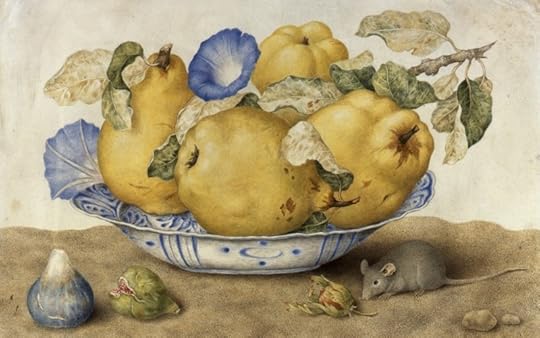
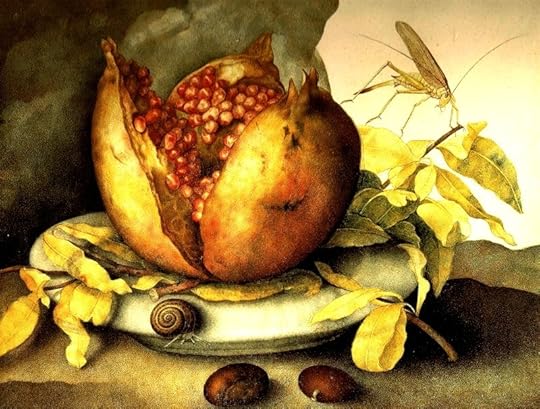
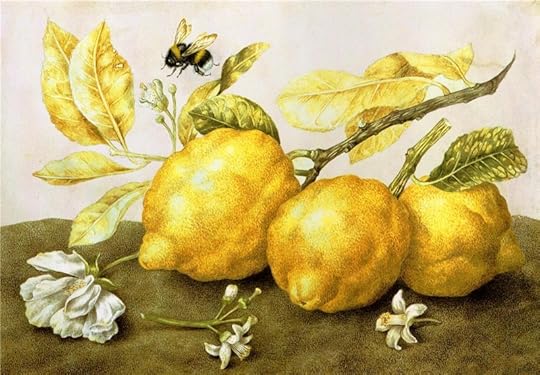
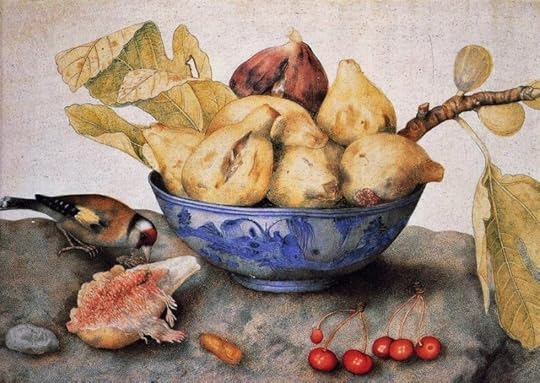
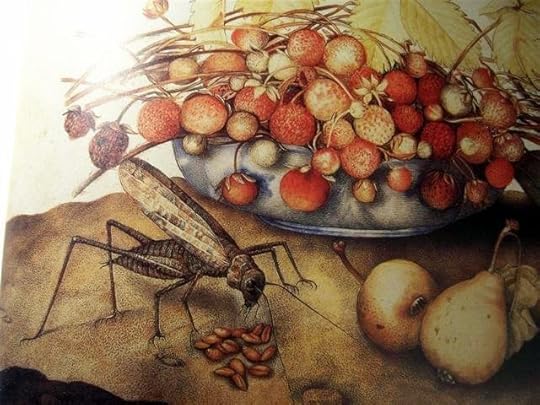
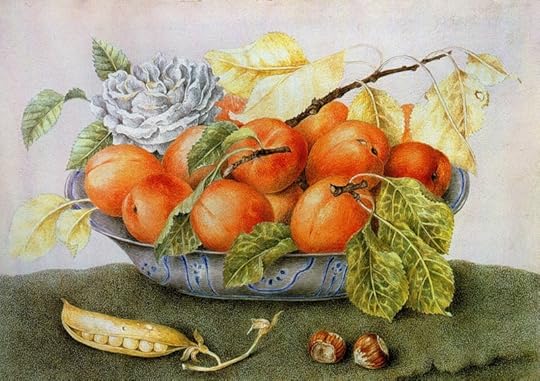
Clearly she loved prickly creatures; may have been one herself, having taken a perpetual vow of chastity.
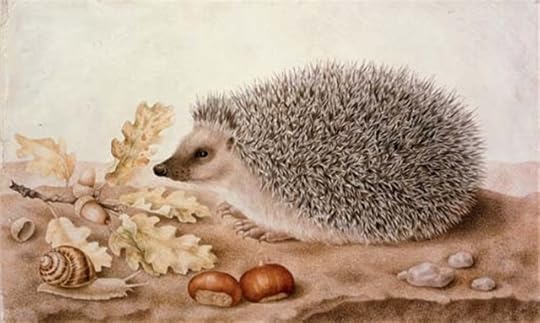
Nine






Clearly she loved prickly creatures; may have been one herself, having taken a perpetual vow of chastity.

Nine
Published on January 10, 2016 15:11
January 9, 2016
Alchemy
In a burst of folly, I bought quinces—how often do you see them in a corner grocery?—and thought, I really must do something with them before they rot.
Really.
They are golden as the apples of Hesperides, and slightly pleated, like a sleeve.
My grandmother had a quince tree, and my mother used to make jelly. (There were plums as well, the size of marbles and the color of Tahiti, as if Gauguin were lurking in the trees.) I loved the transformation from pale yellow to celestial pink—and the heavenly scent of them. So I cut these up with her old wooden-handled crescent chopper, which went through them—if not like butter, like cheese. Nice work: they’re as hard as green wood, hard and springy. Their seed capsules are time-proof. Having quartered and cored, I decided that if I'd gone to all that trouble, I might as well use real vanilla beans and went out for some. And honey, as my last had crystallized.
Note (7:05 pm): The resultant is now simmering. I hope it doesn't burn. Jammy things do, as soon as look at them.
It didn’t!
The quinces turned only the palest blush pink—not enough anthocyanin in this crop, I gather—but O my! They do taste wonderful, more fragrant than apples. The pears of the Peri.
And they have gone on slowly transmuting: this morning, they were peachy pink.
They’d go nicely with cream. And a runcible spoon.
Nine
P.S. I find in myself a ridiculous propensity to sing "Hail, hail Cydonia!"
Really.
They are golden as the apples of Hesperides, and slightly pleated, like a sleeve.
My grandmother had a quince tree, and my mother used to make jelly. (There were plums as well, the size of marbles and the color of Tahiti, as if Gauguin were lurking in the trees.) I loved the transformation from pale yellow to celestial pink—and the heavenly scent of them. So I cut these up with her old wooden-handled crescent chopper, which went through them—if not like butter, like cheese. Nice work: they’re as hard as green wood, hard and springy. Their seed capsules are time-proof. Having quartered and cored, I decided that if I'd gone to all that trouble, I might as well use real vanilla beans and went out for some. And honey, as my last had crystallized.
Note (7:05 pm): The resultant is now simmering. I hope it doesn't burn. Jammy things do, as soon as look at them.
It didn’t!
The quinces turned only the palest blush pink—not enough anthocyanin in this crop, I gather—but O my! They do taste wonderful, more fragrant than apples. The pears of the Peri.
And they have gone on slowly transmuting: this morning, they were peachy pink.
They’d go nicely with cream. And a runcible spoon.
Nine
P.S. I find in myself a ridiculous propensity to sing "Hail, hail Cydonia!"
Published on January 09, 2016 12:07
Greer Gilman's Blog
- Greer Gilman's profile
- 42 followers
Greer Gilman isn't a Goodreads Author
(yet),
but they
do have a blog,
so here are some recent posts imported from
their feed.



